An Inventive, Inspired Inundation
Published: June 1, 2016
Last Updated: September 1, 2016
New Releases from Herlin Riley, Loretta Lynn and Dave Bartholomew
by Ben Sandmel
Like the mighty Mississippi, Louisiana’s musical flow crests each spring with the release of numerous new albums to coincide with a spate of seasonal festivals. The French Quarter Festival, New Orleans Jazz & Heritage Festival, Festival International de Louisiane in Lafayette and other annual events offer great opportunities to market and promote contemporary projects and historic reissues alike. This year’s creative deluge — a musical parallel to opening the Bonnet Carré spillway, if you will — calls for consideration of the diverse riches in its roiling waters.
New Direction
Herlin Riley
Mack Avenue
The world-renowned drummer Herlin Riley is a master of many modern-jazz styles, as well as the New Orleans rhythmic traditions of second-line syncopation, R&B and funk. He carries a musical torch passed on by his talented forbears, the Lastie family, from the city’s Lower Ninth Ward. The patriarch of this dynasty, one of many such musical lineages in New Orleans, was Riley’s grandfather, the drummer Frank Lastie, who became a classmate of Louis Armstrong at the storied Colored Waifs Home, circa 1915. Ensuing years found Frank Lastie performing primarily in his church, and teaching many of his progeny to play. Four of Lastie’s children emerged as professional musicians. Betty Ann, Herlin Riley’s mother, is a pianist and gospel singer. Melvin, whose highly influential trumpet solo graced Barbara George’s 1962 hit “I Know,” also helped found New Orleans’ pioneering African-American-owned record company A.F.O. (All For One) Walter Lastie, known as “Popee,” played drums with R&B piano luminaries including Fats Domino, Professor Longhair and Dr. John. Saxophonist David Lastie played in similar New Orleans R&B circles as well as with such diverse R&B/blues vocalists as Big Joe Turner, Little Willie John, Etta James, Amos Milburn, Ruth Brown and Big Mama Thornton. In addition Frank Lastie was related by marriage to the great New Orleans R&B singer and songwriter Jessie Hill, of “Ooh Poo Pah Doo” fame. During the past five years Hill’s grandson Troy Andrews, known professionally as Trombone Shorty, has emerged from the Crescent City to attain major stardom with his striking fusion of jazz, rock, and funk. Trombone Shorty’s brother, James Andrews, is beloved in New Orleans as a skilled trumpeter and an exuberant, ubiquitous man about town. James Andrews often performs at his family’s Ooh Poo Pah Doo Bar, a last bastion of classic New Orleans R&B that recalls the days when Ernie and Antoinette K-Doe held court at the Mother-In-Law Lounge. In yet another familial connection, Joe Lastie — the acclaimed drummer for the Preservation Hall Jazz Band — is Herlin Riley’s first cousin.
Riley’s lengthy résumé includes tours and sessions with the likes of Ahmad Jamal, the Lincoln Center Jazz Orchestra, Wynton Marsalis, Dianne Reeves, Harry Connick, Jr., Marcus Roberts and George Benson, among many others. These top-tier artists primarily perform at concert halls, but Riley often plays at home in New Orleans at intimate jazz venues including Snug Harbor and The Prime Example. The multi-textured New Direction combines his locally rooted sensibility with widely eclectic sources including flamboyant Afro-Caribbean and Latin rhythmic romps, be-bop, moments of cool sophistication a la Miles Davis’ rendition of the Thelonious Monk composition “Round Midnight,” and much more. In the tradition of the late jazz drummer, bandleader and hands-on teacher Art Blakey, Riley’s band on this album consists of considerably younger musicians, including the noted Cuban percussionist Pedrito Martinez. All play as peers on a highly professional level, and Riley gives each of them ample time in the limelight. He often takes center stage, too, as well as providing expert accompaniment, directing the swirl of ever-moving parts and shifting rhythms with subtlety or full-tilt overdrive, as the moment demands. The result is a compelling and wide-ranging set — comprised almost entirely of original material – that invites repeated and attentive listening in order to absorb all its complexities. In addition to an instrumental entitled “Connection To Congo Square,” Riley most obviously emphasizes his hometown ties on his vocal reprisal of Danny Barker’s rollicking “Tootie Ma.” A newly-minted modern classic, Herlin Riley’s New Direction comes highly recommended.

Loretta Lynn in 2005. Courtesy Wikimedia
Full Circle
Loretta Lynn
Legacy Recordings
The veteran country singer Loretta Lynn has enjoyed an avid following in North Louisiana for over fifty years. During the ‘60s, Lynn frequently performed on the Louisiana Hayride, a popular radio program broadcast live from Shreveport. Her 1973 hit “Louisiana Woman, Mississippi Man,” a boisterous, soulful duet with the late Conway Twitty, retains great appeal in both states. In 1975 Lynn shocked country music’s conservative wing with her defiant feminist statement “The Pill.” Some country radio stations refused to play this ode to simplified, effective and liberating contraception, but Lynn has always blazed her own trail. Despite commercial pressure to assimilate and downplay her Appalachian ethnicity, Lynn has resolutely maintained her unvarnished rural sound and southeastern Kentucky accent.
Remarkably, at 84, Lynn has just released a strong new album entitled Full Circle that belies her age by several decades. Full Circle presents a wide range of material. Its folkloric selections include “Black Jack David,” a traditional British ballad that remained popular for generations in rural Appalachia, and the bluesy “In The Pines,” a song with nineteenth century roots. Bill Monroe, known as the Father of Bluegrass, made “In The Pines” popular in that acoustic string-band country style. The song, with some varying lyrics, was also recorded by Lead Belly, the great north Louisiana blues artist and songster, under the title “Where Did You Sleep last Night?” (The many renditions based on Lead Belly’s arrangement include a 1994 recording by the grunge band Nirvana.) Full Circle also finds Lynn balancing her ominous honky-tonk hit “Fist City” with the introspective “Wine Into Water,” while Elvis Costello sings backup on the ironic, forlorn “Everything It Takes.” The album closes in a duet with fellow octogenarian Willie Nelson on “Lay Me Down”, a poignant statement about fearlessly facing death. In 2016 it is an unexpected joy to hear icons such as Lynn and Nelson still singing with power, proficiency and complete self-confidence.
Remembering an Iconoclast
This column often discusses the porous nature of musical boundaries, and the futility of separating music into tidy categories that never overlap. On that note we mourn the recent passing of the great country music singer and prolific songwriter, Merle Haggard. Haggard’s frequent performances in Louisiana always drew massive crowds, and for years he carried several Cajun musicians in his band. Regrettably Haggard is often solely associated with such right-leaning political songs as “Okie From Muskogee,” which exploited the culture wars of the late 1960s. But Haggard was also a skilled fiddler whose repertoire defied genres and regularly explored the jazz-country synthesis known as western swing, as popularized in the 1930s by the likes of Bob Wills. Such prowess led Haggard to become the only country musician to ever appear on the cover of the venerable jazz magazine Down Beat. This unique honor was also fueled in part by Haggard’s love of traditional New Orleans jazz, as evidenced by his 1973 album “I Love Dixie Blues … So I Recorded Live in New Orleans.”
Dave Bartholomew: Golden Rule In New Orleans—King & Imperial Sides, 1950 – 1961
Dave Bartholomew
Hoodoo Records
A trumpeter, bandleader, songwriter, arranger, producer and singer, Dave Bartholomew was the principal architect of the first generation of New Orleans R&B that emerged in the late 1940s. Bartholomew was trained by Peter Davis, the same music teacher who mentored Louis Armstrong. Bartholomew is best known for his historic, iconic work, in all of the above roles, with Fats Domino. It is safe to say that Domino’s career — and that of other New Orleans R&B artists, including Lloyd Price — would never have ascended without the close involvement of Bartholomew, who was known as a strict and exacting taskmaster. But Bartholomew also made many fine records as a solo artist. They include such perennial favorites as the witty “Who Drank My Beer While I Was In The Rear?,” the hit single “Country Boy,” the caustic existential commentary of “The Monkey Speaks His Mind,” and the Afro-Cuban rumba/mambo instrumental “Shrimp & Gumbo.” These songs plus 26 others appear on the extensively annotated Dave Bartholomew: Golden Rule In New Orleans — King & Imperial Sides, 1950 – 1961. For anyone interested in learning about mid-century New Orleans music, this anthology is essential.
—–
Ben Sandmel is a New Orleans-based freelance writer, folklorist, and producer and is the former drummer for the Hackberry Ramblers. Learn more about his latest book, Ernie K-Doe: The R&B Emperor of New Orleans, by visiting erniekdoebook.com. The K-Doe biography was selected for the Kirkus Reviews list of best nonfiction books for 2012.
